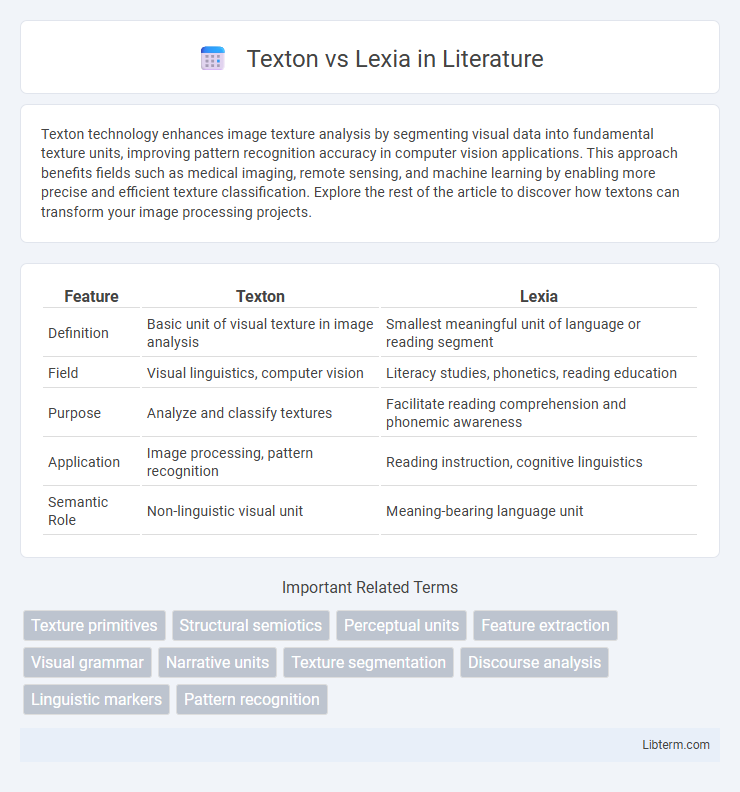Texton technology enhances image texture analysis by segmenting visual data into fundamental texture units, improving pattern recognition accuracy in computer vision applications. This approach benefits fields such as medical imaging, remote sensing, and machine learning by enabling more precise and efficient texture classification. Explore the rest of the article to discover how textons can transform your image processing projects.
Table of Comparison
| Feature | Texton | Lexia |
|---|---|---|
| Definition | Basic unit of visual texture in image analysis | Smallest meaningful unit of language or reading segment |
| Field | Visual linguistics, computer vision | Literacy studies, phonetics, reading education |
| Purpose | Analyze and classify textures | Facilitate reading comprehension and phonemic awareness |
| Application | Image processing, pattern recognition | Reading instruction, cognitive linguistics |
| Semantic Role | Non-linguistic visual unit | Meaning-bearing language unit |
Introduction to Texton and Lexia
Texton and Lexia are advanced linguistic analysis tools designed to enhance natural language processing and semantic understanding. Texton specializes in identifying semantic patterns within large text corpora, leveraging machine learning algorithms to improve text classification and sentiment analysis. Lexia focuses on deep lexical analysis, providing detailed insights into word usage, context, and syntactic relations to optimize language modeling and comprehension tasks.
Overview of Features
Texton offers advanced AI-driven content generation with customizable style settings and SEO optimization tools suited for digital marketers. Lexia provides comprehensive language analysis, literacy assessments, and personalized learning resources primarily designed for educators and students. Both platforms integrate cloud-based solutions but differ in focus: Texton enhances creative content creation, while Lexia emphasizes educational language development.
User Interface Comparison
Texton features a clean, intuitive user interface with customizable dashboards that enhance workflow efficiency, while Lexia offers a more complex layout designed for advanced users, which may require a steeper learning curve. Texton's interface prioritizes simplicity and ease of navigation, optimizing task completion speed, whereas Lexia provides detailed analytical panels and extensive configuration options tailored for expert users. Both platforms support responsive design for cross-device compatibility but differ significantly in their approach to visual hierarchy and user engagement.
Content Creation Capabilities
Texton excels in AI-driven content creation by generating high-quality, contextually relevant text tailored to specific topics and user intents, enhancing content personalization. Lexia offers robust content creation tools with advanced natural language processing that supports multi-format outputs, including blog posts, social media content, and marketing copy, optimizing user engagement across platforms. Both platforms leverage powerful AI algorithms, but Texton's strength lies in producing deeply analytical and niche-specific content, while Lexia emphasizes versatility and cross-channel content adaptation.
Integration and Compatibility
Texton offers seamless integration with popular CRM and ERP systems, ensuring smooth data flow across platforms for enhanced operational efficiency. Lexia supports a wide range of APIs and third-party applications, allowing for customizable compatibility tailored to specific business needs. Both tools prioritize flexible deployment options, but Texton's built-in connectors reduce setup time compared to Lexia's more developer-intensive approach.
Pricing and Plans
Texton offers flexible pricing plans customized to content creation needs, starting from a basic tier with limited word counts and scaling to enterprise solutions with advanced analytics. Lexia provides tiered subscription packages that vary based on user numbers and access to AI-powered writing tools, with options for monthly or annual billing. Both platforms emphasize scalability and cater to individual users as well as businesses, with transparent pricing structures available on their websites.
AI Technology and Algorithms
Texton employs advanced natural language processing algorithms powered by deep learning frameworks to enhance semantic understanding and context awareness in text analysis. Lexia leverages machine learning models combined with transformer-based architectures to optimize language comprehension and predictive text generation. Both platforms utilize AI-driven neural networks, but Texton emphasizes adaptive learning techniques while Lexia focuses on contextual embedding and real-time processing efficiency.
Customer Support and Resources
Texton offers comprehensive customer support with 24/7 live chat and a dedicated help center featuring extensive FAQs, tutorials, and video guides, ensuring users receive timely assistance. Lexia provides responsive email support coupled with a robust resource library that includes webinars, case studies, and user forums to facilitate self-help and community engagement. Both platforms emphasize user empowerment through detailed documentation, but Texton stands out for real-time support availability.
User Reviews and Feedback
User reviews highlight Texton's intuitive interface and responsive customer support, making it a preferred choice for small businesses prioritizing ease of use. Lexia receives praise for its advanced analytics and customization options, appealing to tech-savvy users seeking detailed data insights. Feedback for both platforms emphasizes reliability, though Lexia users note a steeper learning curve compared to Texton's straightforward setup.
Which Tool is Best for Your Needs?
Texton offers advanced natural language processing capabilities ideal for data-driven businesses requiring precise sentiment analysis and text classification, while Lexia excels in personalized literacy and reading intervention, tailored to educators and students seeking targeted skill development. Choosing between Texton and Lexia depends on whether your primary focus is on comprehensive text analytics or improving reading proficiency through adaptive learning programs. Evaluating your specific goals -- such as enhancing customer insights versus boosting educational outcomes -- will determine the best tool for your needs.
Texton Infographic

 libterm.com
libterm.com